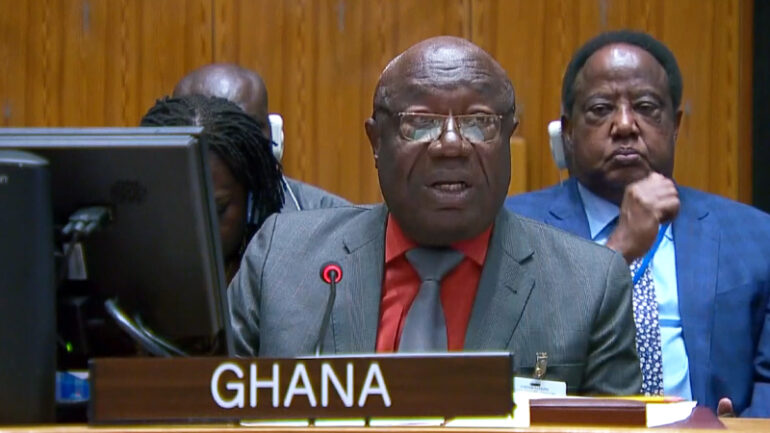UNSC Briefing on the values of human fraternity in promoting and sustaining peace

Hon. Dr. Kwaku Afriyie
Minister Environment, Science,
Technology and Innovation (MESTI),
Security Council Chamber, New York
DURING A HIGH-LEVEL BRIEFING OF THE SECURITY COUNCIL ONTHE VALUES OF HUMAN FRATERNITY IN PROMOTING AND SUSTAINING PEACE
Madam President [Your Excellency Ms. Noura bint Mohammed Al Kaabi, Minister of State]
I thank United Arab Emirates (UAE) for organising today’s open debate that contributes to our collective efforts to promote and sustain global peace. We thank the Secretary-General of the United Nations, Mr. António Guterres, for his briefing. We are also grateful to His Eminence Ahmed Al-Tayeb, the Grand Imam of Al-Azhar and Chairman of the Muslim Council of Elders, His Excellency
Archbishop Paul Richard Gallagher, Secretary for Relations with States of the Holy See, and Ms. Latifa Ibn Ziaten, Founder and President of IMAD Association for Youth and Peace, for their insightful perspectives.
Madam President,
Celebrating human fraternity and the ideals it upholds reminds us of the shared principles that bind all of mankind together. Undeniably, some of humanity’s greatest advancements may not have been possible without intense peaceful cultural cooperation. Even to date, diversity in perspectives, cultures, beliefs, and ways of life remains the driving force in human advancement. For this reason, we commend the United Arab Emirates and its partners for putting the values of compassion, religious understanding, tolerance, and mutual respect, high on the agenda of the UN. This is particularly important when many people of different faiths and cultures now coexist. The proclamation of International Day of Fraternity and World Interfaith Harmony Week by the UN General Assembly resolutions 75/200(2019) and 65/5 (2010), respectively, reminds us of our common humanity and the need to live together in peace and harmony, irrespective of our differences.
We must, therefore, embrace our differences and diversity and eschew tendencies that drive a wedge between us and our cultures, resulting in mistrust and violence. Unfortunately, in recent times, an upsurge in hate speech and incitement of hatred, intolerance, racism, and violent extremism is posing a threat to peaceful coexistence among people of different faiths, cultures, and in some cases, those of different political persuasions. According to our compatriot and former SecretaryGeneral of the UN, Kofi Annan, “Conflicts between countries have, thankfully, become less common. But conflicts and tensions within societies and between cultures have become more prominent”. Regrettably, this is fuelled largely by social media, which provides a much wider audience for disseminating such bigotry. We remain concerned over the potential radicalizing effects of easily accessible online violent extremist content and its resultant resonance with segments of the youth. As we condemn the exploitation of such mass communication media for bigotry, we call on social media platforms to do more to rid their platforms of violent extremist content.
Madam President,
In Africa and elsewhere, we have witnessed the devastating consequences of hate speech pitting people of different religions or cultures that had hitherto lived in peace and harmony against one another. Vitriolic statements intended to offend others and incite hatred and discrimination based on race, nationality, religious identity, gender, or other group membership, are used to inflame tensions between different peoples and cultures. We wholeheartedly agree with the UN’s recognition of such hateful utterances in its Strategy and Plan of Action on Hate Speech as a “precursor to atrocity crimes, including genocide”. Similarly, on the back of this Council’s insightful debate on the need for strategic communications to ensure effective peacekeeping, let me underscore the
importance of identifying and defeating the threat posed by a toxic mix of misinformation, disinformation, and fake news to our collective peace and security. Nowhere is this more potent than the Sahel, where they are being deployed by malign forces to facilitate terrorism and violent extremism, including through recruitment and radicalization. In reaffirming Ghana’s commitment to the protection of the legitimate exercise of freedom of expression, it is important to hold to account those who disregard sacred symbols and practices or speech that offends religious sensibilities or display intolerance to preserve societal peace and security. It is no secret that such conduct has been known to provoke or incite violence.
Madam President,
At this juncture, let me speak about what we are doing in Ghana to promote human fraternity, which has given rise to peaceful coexistence among people of different ethnicities and faiths and made our country a model of interfaith tolerance and cooperation in Africa. Comparatively, different ethnic groups, Christians, Muslims, and adherents of African traditional religion in Ghana, have lived in peace and harmony since our nation’s founding. This journey begins at the basic level of education, where the curricula expose school children to the cultures of the over 40 ethnic groups in Ghana and the teachings of the three religions by inculcating in them the spirit of tolerance, non-discrimination, and peaceful coexistence. Similar to the “Abrahamic Family House” in the UAE, which houses a mosque, a church, and a synagogue, in Ghana, it is not uncommon to find a mosque within striking distance of a church or a shrine. Even with this feat, our National Peace Council (NPC) continues to develop and enhance national mechanisms for conflict prevention and sustainable peacebuilding. The NPC, established by an act of Parliament in 2011 as an interfaith and multi-ethnic body, has in place a robust conflict early warning system across the 16 regions of Ghana that works to prevent conflict and adjudicate on tensions between ethnic and religious groups.
To conclude, maintaining global peace and security in today’s interconnected and interdependent world requires regard for international norms, dialogue, mutual respect, tolerance and understanding between communities and countries. Instead of revolting against globalization by advocating isolationism, nationalism, and protectionism, we must embrace it and work to address its associated challenges. Minorities, people of different skin colours and faiths, and migrants and refugees deserve to be treated with empathy and compassion for the sake of our common
humanity.
I thank you for your attention.
